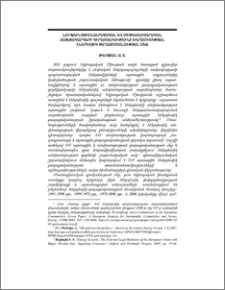Object
Title: Նորֆունկցիոնալիստական և միջկառավարական հայեցակարգերի կիրառելիությունը Եվրամիության էներգետիկ քաղաքականության մեջ
Journal or Publication Title:
Լրաբեր հասարակական գիտությունների=Herald of the Social Sciences=Вестник общественных наук
Date of publication:
Volume:
Number:
ISSN:
Official URL:
Additional Information:
Other title:
Contributor(s):
Պատ․ խմբ՝. Հ․ Գ․ Ինճիկյան (1966-1968) ; Գլխավոր խմբ.՝ Ծ․ Պ․ Աղայան (1969-1972) ; Վ․ Ա․ Միքայելյան (1972-1987) ; Ա․ Ա․ Խառատյան (1988-2017)
Coverage:
Abstract:
Исследования общих закономерностей формирования и развития общеевропейской энергетической политики показывают, что в странах ЕС наметились тенденции, свидетельствующие о нежелании государств идти на дальнейшее углубление интеграции, что и является объектом теоретических обобщений и концептуального анализа процесса с точки зрения лидирующих теорий европейской интеграции – неофункционализма и межправительственного подхода. During the first decade of the 21st century, energy security has emerged as a key issue on the European foreign and security policy agenda, increasingly perceived by both national governments and European Union institutions as an area of priority concern due to the depletion of intra-EU resources and growing dependence on external energy supplies. In an attempt to overcome existing gaps between the theories and practice,several relevant issues regarding the evolution, nature, tools and goals, as well as normative, institutional, and functional aspects of the EU’s external energy policy have been investigated from the perspective of intergovernmentalist and neo-functionalist approaches.
Place of publishing:
Երևան
Publisher:
Date created:
Format:
Identifier:
oai:arar.sci.am:39493
Call number:
Location of original object:
ՀՀ ԳԱԱ Հիմնարար գիտական գրադարան
Object collections:
Last modified:
Jan 12, 2026
In our library since:
Mar 3, 2020
Number of object content hits:
52
All available object's versions:
https://arar.sci.am/publication/44033
Show description in RDF format:
Show description in OAI-PMH format:
-
Լրաբեր հասարակական գիտությունների=Herald of the Social Sciences=Вестник общественных наук
-
Լրաբեր հասարակական գիտությունների, 1966
-
Լրաբեր հասարակական գիտությունների, 1967
-
Լրաբեր հասարակական գիտությունների, 1968
-
Լրաբեր հասարակական գիտությունների, 1969
-
Լրաբեր հասարակական գիտությունների, 1970
-
Լրաբեր հասարակական գիտությունների, 1971
-
Լրաբեր հասարակական գիտությունների, 1972
-
Լրաբեր հասարակական գիտությունների, 1973
-
Լրաբեր հասարակական գիտությունների, 1974
-
Լրաբեր հասարակական գիտությունների, 1975
-
Լրաբեր հասարակական գիտությունների, 1976
-
Լրաբեր հասարակական գիտությունների, 1977
-
Լրաբեր հասարակական գիտությունների, 1978
-
Լրաբեր հասարակական գիտությունների, 1979
-
Լրաբեր հասարակական գիտությունների, 1980
-
Լրաբեր հասարակական գիտությունների, 1981
-
Լրաբեր հասարակական գիտությունների, 1982
-
Լրաբեր հասարակական գիտությունների, 1983
-
Լրաբեր հասարակական գիտությունների, 1984
-
Լրաբեր հասարակական գիտությունների, 1985
-
Լրաբեր հասարակական գիտությունների, 1986
-
Լրաբեր հասարակական գիտությունների, 1987
-
Լրաբեր հասարակական գիտությունների, 1988
-
Լրաբեր հասարակական գիտությունների, 1989
-
Լրաբեր հասարակական գիտությունների, 1990
-
Լրաբեր հասարակական գիտությունների, 1991
-
Լրաբեր հասարակական գիտությունների, 1992
-
Լրաբեր հասարակական գիտությունների, 1993
-
Լրաբեր հասարակական գիտությունների, 1994
-
Լրաբեր հասարակական գիտությունների, 1995
-
Լրաբեր հասարակական գիտությունների, 1996
-
Լրաբեր հասարակական գիտությունների, 1997
-
Լրաբեր հասարակական գիտությունների, 1998
-
Լրաբեր հասարակական գիտությունների, 1999
-
Լրաբեր հասարակական գիտությունների, 2000
-
Լրաբեր հասարակական գիտությունների, 2001
-
Լրաբեր հասարակական գիտությունների, 2002
-
Լրաբեր հասարակական գիտությունների, 2003
-
Լրաբեր հասարակական գիտությունների, 2004
-
Լրաբեր հասարակական գիտությունների, 2005
-
Լրաբեր հասարակական գիտությունների, 2006
-
Լրաբեր հասարակական գիտությունների, 2007
-
Լրաբեր հասարակական գիտությունների, 2008
-
Լրաբեր հասարակական գիտությունների, 2009
-
Լրաբեր հասարակական գիտությունների, 2010
-
Լրաբեր հասարակական գիտությունների, 2011
-
Լրաբեր հասարակական գիտությունների, 2012
-
Լրաբեր հասարակական գիտությունների, 2013
-
Լրաբեր հասարակական գիտությունների, 2013, № 1
-
Լրաբեր հասարակական գիտությունների, 2013, № 2
- Դրվագներ ՀՀ ԳԱԱ հայագիտական և հասարակագիտական ինստիտուտների գործունեությունից
- Խմբագրական խորհուրդ
- Բովանդակություն
- Юбилей известного историка-антиковеда
- Գիտնականի արգասաբեր ուղին
- Ալմաստ Զաքարյանը հայ գրականագիտության մեջ
- Լուսավոր հետք հայոց պատմության ծիրում
- Биография академика Иосифа Орбели
- Հովսեփ Օրբելու ներդրումը հայագիտության բնագավառում
- Հայացք Հայաստանի գիտությունների ակադեմիայի հիմնադիր անդամ Մանուկ Աբեղյանի գործունեությանը
- ՀՀ ԳԱԱ Մ. Քոթանյանի անվան տնտեսագիտության ինստիտուտի գիտական ներդրումը
- Փավստոս Բուզանդը Հայաստանի պետական կառավարման համակարգի և բանակի մասին
- Հյուսիսարևելյան Այսրկովկասի կիսանկախ խանությունների կարգավիճակի ձևավորումը (1750-1770-ական թթ.)
- Բողոքականության տարածման պատճառները արևմտահայության շրջանում XIX դարի վերջին և XX դարի սկզբին
- Հայաստանի և Ադրբեջանի մասնակցությունը Փարիզի Խաղաղության կոնֆերանսին (1919-1920 թթ.)
- Ազգային անվտանգության արժեքային նշանակությունը և կառուցվածքային հիմնատարրերը
- Թանգարան և վեբկայք. գաղափարախոսությունը և քաղաքականությունը Հրեից հոլոքոստին նվիրված երեք թանգարանների օրինակով
- Էլիտաների տեսություն
- Նորֆունկցիոնալիստական և միջկառավարական հայեցակարգերի կիրառելիությունը Եվրամիության էներգետիկ քաղաքականության մեջ
- Թյուրքալեզու ցեղերի վաղ պատմության ուսումնասիրության աղբյուրները
- Մարդկային կապիտալը և նրա հումանիստական չափումը
- Անտիկ փիլիսոփայության տրամաբանությունը և գիտության վերակառուցման հետպոզիտիվիստական հայեցակարգը
- Միգրացիան և մշակութային փոխակերպումները
- Финансово-экономический кризис и трудовая миграция
- Կոստան Զարյանի «Տատրագոմի հարսը» պոեմը Ավետիս Ահարոնյանի գնահատմամբ
- Лирические проекции героев романа Андрея Битова ”Ожидание обезьян”
- Испания в армянских источниках раннего средневековья
- Աստվածաշնչի գրաբար բնագրում գործածված դարձվածքները
- «Ջուր» բաղադրիչով դարձվածային միավորները հայերենում, ռուսերենում և անգլերենում
- Սոցիալիստական ռեալիզմ (ծագման և զարգացման պատմության շուրջ)
- Մատենադարանի N 9422 ձեռագիր Ավետարանի լուսանցազարդերն ու անվանաթերթերը
- Վ. Ս. Մաղալյան, Հայ տեղական մամուլը և գրատպությունը Վրաստանում, Ե., ԵՊՀ հրատարակչություն, 2012, 255 էջ:
- Նոր հազարամյակի հումանիստական պարադիգմայի հարցի շուրջ
-
Լրաբեր հասարակական գիտությունների, 2013, № 3
-
Լրաբեր հասարակական գիտությունների, 2013, № 1
-
Լրաբեր հասարակական գիտությունների, 2014
-
Լրաբեր հասարակական գիտությունների, 2015
-
Լրաբեր հասարակական գիտությունների, 2016
-
Լրաբեր հասարակական գիտությունների, 2017
-
Լրաբեր հասարակական գիտությունների, 2018
-
Լրաբեր հասարակական գիտությունների, 2019
-
Լրաբեր հասարակական գիտությունների, 2020
-
Լրաբեր հասարակական գիտությունների, 2021
-
Լրաբեր հասարակական գիտությունների, 2022
-
Լրաբեր հասարակական գիտությունների, 2023
-
Լրաբեր հասարակական գիտությունների, 2024
-
Լրաբեր հասարակական գիտությունների, 2025
-
Լրաբեր հասարակական գիտությունների, 1966
| Edition name | Date |
|---|---|
| Նորֆունկցիոնալիստական և միջկառավարական հայեցակարգերի կիրառելիությունը Եվրամիության էներգետիկ քաղաքականության մեջ | Jan 12, 2026 |





